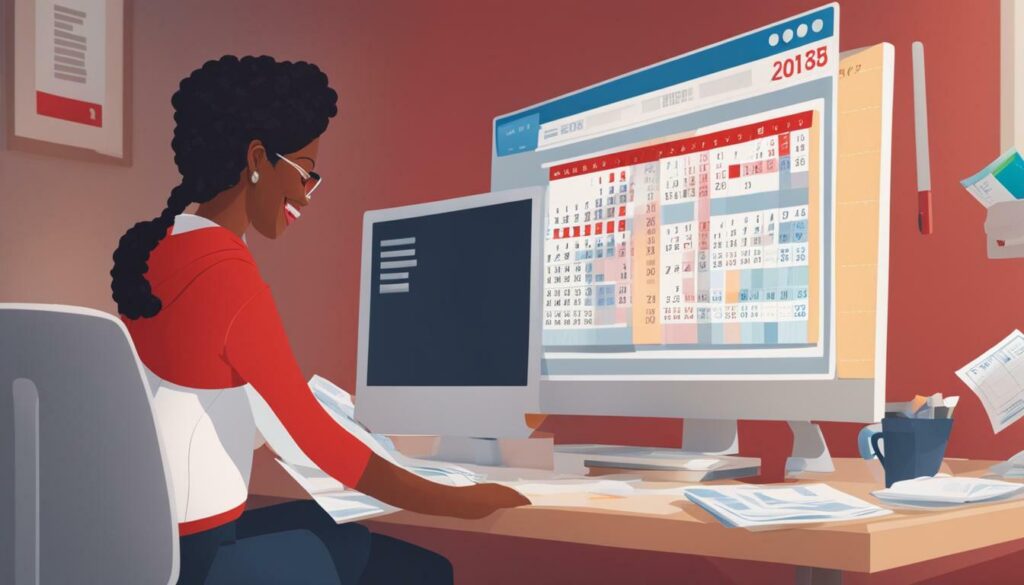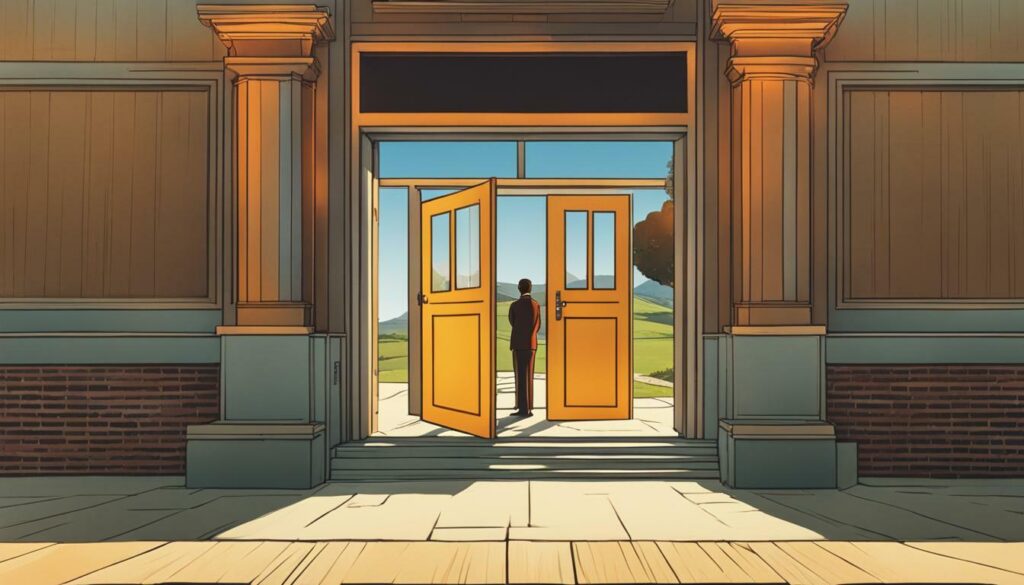Unlock Better Finance: Credit Repair Strategies for Improving Credit Scores

Credit repair is a crucial step in achieving better financial health and unlocking opportunities for financial growth. Improving your credit score is not only beneficial for securing loans and favorable interest rates, but it also reflects your financial responsibility and credibility. By employing effective credit repair strategies, you can take control of your creditworthiness and set yourself on a path to financial success.
- Building a strong credit file is essential for improving credit scores.
- Making on-time payments is vital to demonstrate financial responsibility.
- Addressing past-due accounts can help repair credit and improve credit scores.
- Paying down revolving account balances reduces debt utilization and boosts credit scores.
- Limiting new credit applications can prevent negative impacts on credit scores.
Remember, credit repair is a process that takes time and effort. By implementing these credit repair strategies, you can gradually improve your credit scores and open the doors to better financial opportunities. Take charge of your credit today and unlock a brighter financial future.
Understanding the Basics of Credit Repair
Improving your credit score starts with understanding the basics of credit repair and implementing effective strategies. A good credit score is crucial for unlocking better finance opportunities, whether it’s obtaining a mortgage, qualifying for lower interest rates, or securing favorable insurance premiums.
There are various ways to boost your credit score, and it begins with building a solid credit file. A strong credit file is built by establishing a positive credit history through responsible borrowing and timely repayments. This can be achieved by opening new credit accounts, becoming an authorized user on someone else’s account, or utilizing a secured credit card.
Making on-time payments is another key factor in credit repair. By staying organized with bill payments and ensuring that all payments are made promptly, you can demonstrate financial responsibility and improve your creditworthiness. Setting up automatic payments or reminders can help you stay on top of your payment schedule.
🚨 TUIC Errors + Low Credit Score?
CreditScoreIQ helps you build credit faster by reporting utility bills to all 3 bureaus—while you dispute errors.
Start Building Credit Today →It’s also important to address any past-due accounts to repair your credit. By negotiating payment plans, reaching out to your creditors, or seeking professional assistance, you can work towards resolving outstanding debts and minimizing the negative impact on your credit score.
The Impact of Debt Utilization on Credit Scores
Debt utilization, also known as your debt-to-credit ratio, is another crucial aspect of credit repair. It measures the amount of credit you are using compared to your available credit limits. High debt utilization can negatively impact your credit scores. To improve your credit, focus on paying down revolving account balances such as credit card debt. By reducing your balances and effectively managing your credit utilization, you can positively impact your credit score.
As you work towards repairing your credit, it’s crucial to limit new credit applications. Excessive credit inquiries within a short period can raise red flags and lower your credit score. Only apply for new credit when necessary or strategic, and carefully consider the impact it may have on your creditworthiness.
In conclusion, understanding the basics of credit repair and implementing effective strategies is key to improving your credit score. Building a strong credit file, making on-time payments, addressing past-due accounts, paying down revolving account balances, and limiting new credit applications are all essential steps in repairing your credit. By taking proactive measures, you can unlock better finance opportunities and pave the way for a brighter financial future.
Building Your Credit File
Building a solid credit file lays the foundation for improving your credit score and overall financial well-being. Your credit file is a record of your credit history and is used by lenders to determine your creditworthiness. By taking strategic steps to build a positive credit file, you can enhance your chances of getting approved for loans, credit cards, and other financial opportunities.
One effective way to build your credit file is by opening new credit accounts. This demonstrates to lenders that you can responsibly manage credit. Start by applying for a credit card or a small loan, and make sure to use the credit responsibly. Pay off your balances in full and on time to show that you are a reliable borrower. Additionally, consider becoming an authorized user on someone else’s credit card. This allows you to piggyback off their good credit history and can boost your own credit score.
Another method to build your credit file is by using a secured credit card. With a secured credit card, you provide a security deposit upfront, which serves as collateral for the card. This lowers the risk for the lender and allows you to establish a positive credit history. Make sure to use the secured credit card responsibly and pay off your balances on time to build a solid credit file.
| Building Your Credit File Tips: |
|---|
| Open new credit accounts |
| Be added as an authorized user on someone else’s credit card |
| Use a secured credit card responsibly |
“Building a solid credit file is like building a strong financial foundation. It takes time and effort, but the rewards are worth it. By responsibly managing your credit and taking advantage of opportunities to establish positive credit history, you can unlock better financial opportunities and achieve your financial goals.”
Remember, building your credit file is an ongoing process. It requires consistent effort and responsible credit management. Regularly review your credit report and dispute any errors or inaccuracies. By staying proactive and committed to building a positive credit file, you can improve your credit scores and open doors to better financial options.
Summary:
Building your credit file is essential in improving your credit score and overall financial well-being. To establish a positive credit history, open new credit accounts, become an authorized user on someone else’s credit card, or use a secured credit card responsibly. These strategies can help you demonstrate your creditworthiness to lenders and increase your chances of accessing favorable financial opportunities.

Timely payments play a crucial role in elevating your credit score, demonstrating responsible financial behavior. By consistently paying your bills on time, you show lenders that you are reliable and trustworthy when it comes to managing your financial obligations. This, in turn, can have a positive impact on your credit score and improve your overall creditworthiness.
To ensure that you make on-time payments, it’s essential to stay organized and keep track of your due dates. One effective way to do this is by setting up automatic payments through your bank or credit card provider. By automating your payments, you can avoid the risk of forgetting or missing a payment, which can negatively impact your credit score.
Another helpful strategy is to set up reminders for yourself. Use your smartphone or a calendar app to schedule reminders a few days before your bills are due. This way, you’ll have ample time to make the necessary arrangements and ensure that your payments are made on time.
| Benefit | Strategy |
|---|---|
| Improved credit score | Set up automatic payments |
| Reduced risk of late payments | Utilize reminders and alerts |
| Positive payment history | Pay bills before they’re due |
“Late payments can have a significant impact on your credit score. By making on-time payments, you can maintain a positive payment history and boost your creditworthiness.”
Remember, the length of your payment history and the frequency of on-time payments are also factors that contribute to your credit score. Building a strong payment history by consistently making on-time payments can help improve your creditworthiness over time.
By establishing a habit of making on-time payments and incorporating strategies like automatic payments and reminders, you can take control of your financial obligations and work towards improving your credit score.

Tackling past-due accounts is a vital step in repairing your credit and moving towards a healthier financial future. When accounts become delinquent and payments are missed, it can have a significant negative impact on your credit score. However, there are strategies you can use to catch up on past-due accounts and start rebuilding your credit.
1. Negotiating Payment Plans: If you are unable to pay the full amount owed on past-due accounts, reach out to your creditors and negotiate a payment plan. Many creditors are willing to work with you to establish a feasible repayment schedule. By making regular payments, you can gradually reduce the past-due balance and demonstrate your commitment to honoring your financial obligations.
2. Seeking Professional Assistance: If you are overwhelmed by past-due accounts and struggling to manage your debts, consider seeking professional assistance. Credit counseling agencies and debt management companies can help you create a personalized plan to address your debts and negotiate with creditors on your behalf.
3. Reaching Out to Creditors: Don’t hesitate to contact your creditors directly to discuss your situation. Explain any extenuating circumstances that may have led to the delinquency, and explore possible options for resolving the past-due accounts. Open communication can often lead to mutually beneficial solutions.

| Consequence | Explanation |
|---|---|
| Negative impact on credit score | Delinquent accounts and missed payments can significantly lower your credit score, making it harder to obtain credit in the future. |
| Increase in interest rates | Having past-due accounts can lead to higher interest rates on loans and credit cards, resulting in increased borrowing costs. |
| Difficulty in obtaining new credit | Lenders may be reluctant to extend credit to individuals with a history of past-due accounts, limiting access to financial opportunities. |
| Collections and legal actions | In extreme cases, past-due accounts can be referred to collections agencies or result in legal actions, leading to further financial distress. |
By taking proactive measures to catch up on past-due accounts, you can start rebuilding your credit and working towards a more stable financial future. Remember, it’s never too late to take control of your finances and improve your creditworthiness. With time and responsible financial behavior, you can overcome the negative effects of past-due accounts and unlock better financial opportunities.
Paying Down Revolving Account Balances
Lowering your revolving account balances can significantly boost your credit score and enhance your financial profile. Debt utilization, or the ratio of debt to credit limits, is a crucial factor that can impact your creditworthiness. Lenders and credit bureaus consider lower debt utilization to be a positive sign of responsible financial management.
One effective strategy for paying down revolving account balances is to prioritize high-interest credit card debt. Start by making a list of all your outstanding balances and their corresponding interest rates. With this information, you can determine which accounts are costing you the most in interest charges. By focusing on these accounts first and allocating more funds towards their repayment, you can make significant progress in reducing your overall debt.
Consider consolidating your credit card debt into a single loan or credit line with a lower interest rate. This can help streamline your repayments and make them more manageable. Additionally, requesting a credit limit increase can also lower your debt utilization ratio, as long as you do not increase your spending. Be cautious with this strategy, as it may require a hard credit inquiry, which can temporarily impact your credit score.
| Revolving Account | Outstanding Balance | Interest Rate |
|---|---|---|
| Credit Card 1 | $3,000 | 18% |
| Credit Card 2 | $2,500 | 15% |
| Credit Card 3 | $1,500 | 10% |
Remember, paying down revolving account balances takes time and persistence. It is important to make consistent and timely payments to gradually reduce your debt. As you make progress, regularly check your credit reports to ensure that your efforts are being accurately reflected in your credit history.

By actively managing your revolving account balances, you can improve your credit score and increase your chances of securing better financial opportunities in the future. It’s worth the effort to reduce your debt and strengthen your financial foundation.
Limiting New Credit Applications
Being mindful of your credit applications can help maintain a positive credit history and prevent unnecessary credit score fluctuations. When you apply for new credit, it triggers a hard inquiry on your credit report, which can temporarily lower your credit score. Multiple credit inquiries within a short period of time can signal to lenders that you may be experiencing financial difficulties or taking on too much debt, leading to potential denials or higher interest rates.
To limit new credit applications, start by carefully evaluating your need for additional credit. Ask yourself if you truly need a new credit card or loan at this time. If it’s necessary, do your research to find the best option that suits your financial goals and credit profile. Applying for credit cards or loans that align with your creditworthiness can increase your chances of approval.
Another strategy to limit new credit applications is to avoid submitting multiple applications simultaneously. Instead, space out your applications over time. This allows you to assess the outcome of each application and make necessary adjustments if needed. Additionally, consider pre-qualifying for credit offers before submitting a formal application. Pre-qualification allows you to gauge your likelihood of approval without impacting your credit score.
By avoiding excessive credit applications, you can protect your credit score and maintain a healthy credit history. Remember, each credit application has the potential to impact your creditworthiness, so it’s crucial to be strategic and intentional when seeking new credit opportunities.

By implementing the effective credit repair strategies outlined in this article, you can take control of your credit score and pave the way for a brighter financial future.
Credit repair is an important step in improving credit scores and unlocking better finance. There are several strategies to improve credit scores, including building your credit file, making on-time payments, catching up on past-due accounts, paying down revolving account balances, and limiting new credit applications.
The length of time it takes to rebuild credit depends on individual circumstances, but negative marks generally fall off credit reports after seven years. Debt utilization, or the ratio of debt to credit limits, is another factor that can impact credit scores.
By paying down credit card debt, paying bills before they’re due, consolidating debt, or requesting a credit limit increase, it’s possible to lower debt utilization and improve credit scores. Managing credit utilization alongside other factors such as payment history, credit inquiries, age of credit, and types of credit can help in building good credit scores.
FAQ
Q: What is credit repair and why is it important?
Credit repair is the process of improving credit scores by addressing negative marks and implementing strategies to build positive credit history. It is important because better credit scores can unlock better finance opportunities and lower interest rates.
Q: What are some strategies to improve credit scores?
There are several strategies to improve credit scores, including building your credit file, making on-time payments, catching up on past-due accounts, paying down revolving account balances, and limiting new credit applications.
Q: How long does it take to rebuild credit?
The length of time it takes to rebuild credit depends on individual circumstances. However, negative marks generally fall off credit reports after seven years.
Q: How does debt utilization impact credit scores?
Debt utilization, or the ratio of debt to credit limits, is a factor that can impact credit scores. By paying down credit card debt, paying bills before they’re due, consolidating debt, or requesting a credit limit increase, it’s possible to lower debt utilization and improve credit scores.
Q: What other factors affect credit scores?
Other factors that can impact credit scores include payment history, credit inquiries, age of credit, and types of credit. Managing credit utilization alongside these factors can help in building good credit scores.
Ready to Improve Your Credit?
Disputing TUIC errors is step one. Step two? Boost your score by reporting utility payments with CreditScoreIQ.
Get Started Now (Only $1 Trial) →3-bureau reporting • $1M identity insurance • Dark web monitoring






